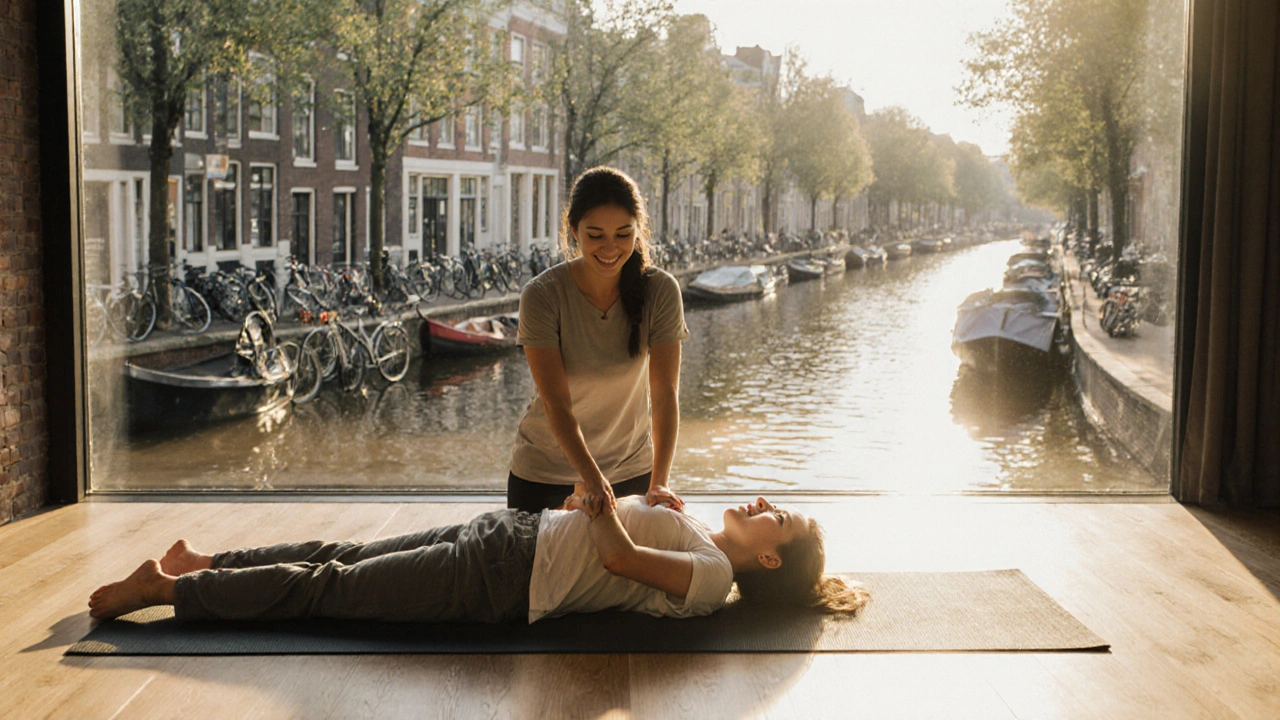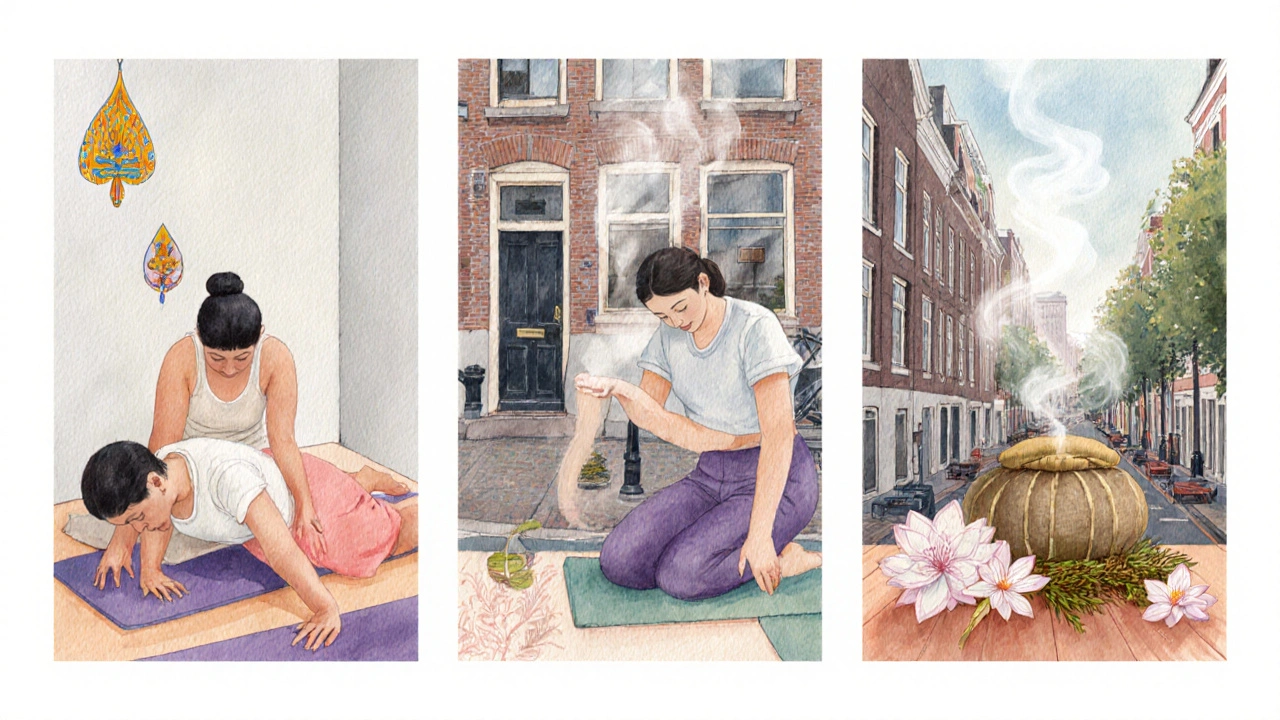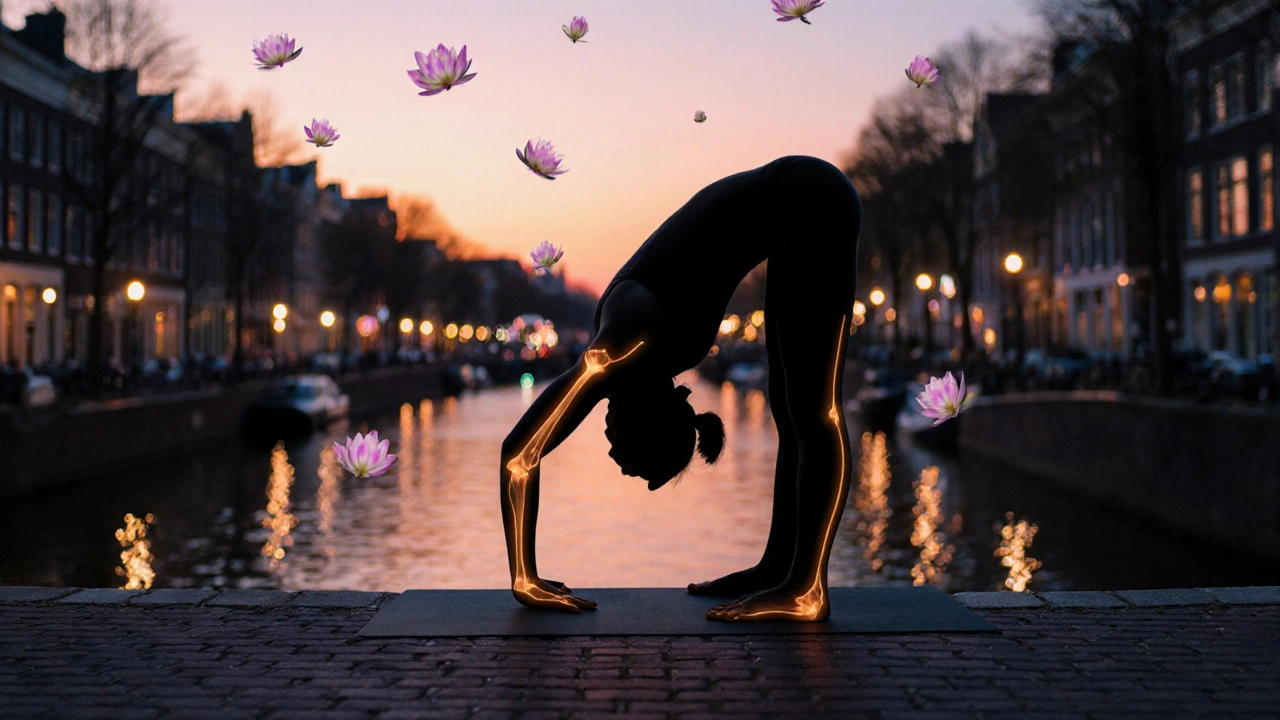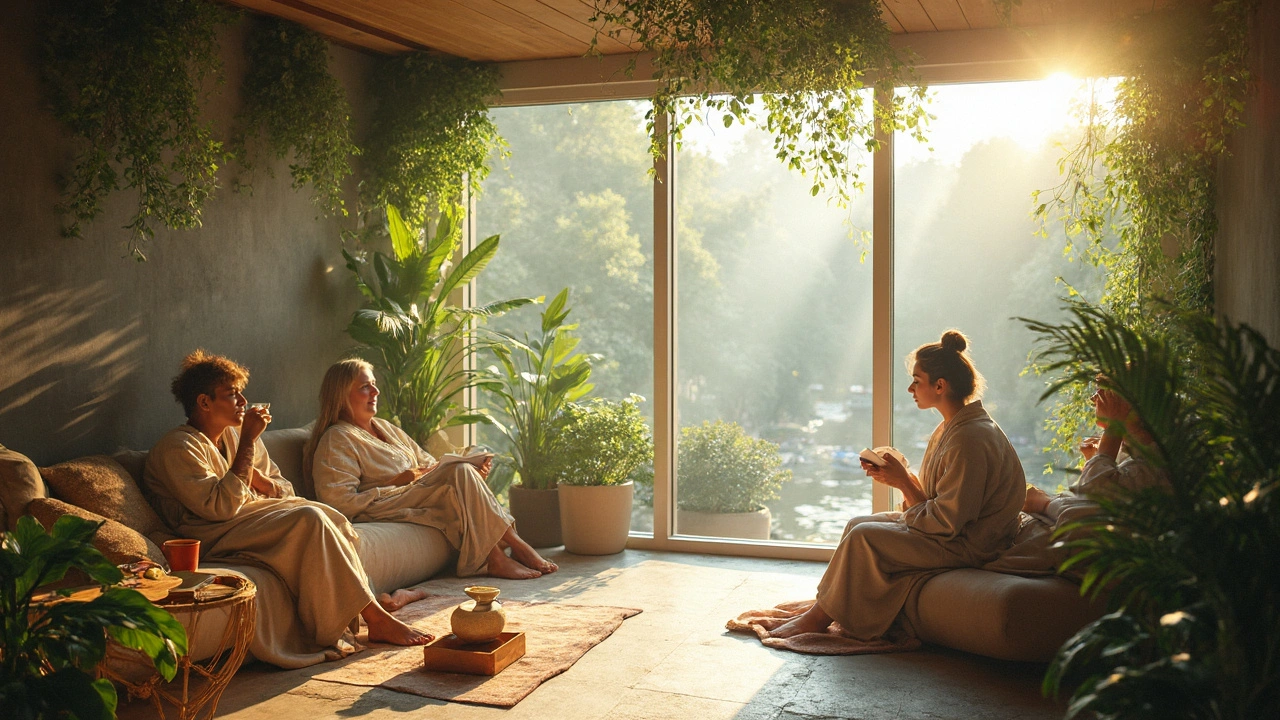Thai Massage in Amsterdam: Boost Your Flexibility

Key Points
- Thai massage combines rhythmic compressions with assisted stretching.
- Regular sessions can increase joint range of motion by up to 15%.
- Amsterdam offers traditional, yoga‑style, and herbal‑compress Thai massage.
- Typical price: €65‑€95 per 90‑minute session.
- Most people can safely enjoy Thai massage, but contraindications exist.
Direct Answer
Yes - a Thai Massage Amsterdam session improves flexibility by actively stretching muscles, mobilising joints, and releasing fascia, all while encouraging better circulation and endorphin flow.
Comprehensive Guide to Thai Massage and Flexibility
Imagine a workout where a therapist does most of the heavy lifting for you. That’s Thai massage in a nutshell, and in a city like Amsterdam it’s easier than ever to tap into this ancient practice.
Definition and Context
When you step into a studio, Thai Massage is a traditional healing art from Thailand that blends rhythmic compressions, assisted stretches, and pressure‑point work. Originating in the 13th century as a form of Thai medicine, it travelled across Southeast Asia before finding a home in Western wellness hubs. In Amsterdam is the Netherlands’ most international city, known for its canals, bike culture, and a thriving holistic‑health scene, you’ll find dozens of studios offering authentic Thai massage to locals and tourists alike.
Benefits of Thai Massage
Beyond the blissful feeling after a session, Thai massage delivers measurable health perks:
- Flexibility is enhanced as therapist‑guided stretches lengthen muscle fibers and improve joint articulation.
- Improved circulation helps deliver oxygen and nutrients to tight areas, speeding recovery.
- Release of fascia reduces adhesions that limit movement.
- Boosted endorphin levels provide natural pain relief and mood elevation.
- Enhanced proprioception - you become more aware of how your body moves.
Clients often report being able to touch their toes more easily after just a few sessions.

Types of Thai Massage Available in Amsterdam
Amsterdam’s wellness scene tailors Thai massage to different preferences:
- Traditional Thai - uses hands, elbows, knees, and feet for deep, rhythmic stretching.
- Yoga‑Style Thai - incorporates yoga poses; ideal for yoga enthusiasts.
- Herbal‑Compress Thai - warm herb bundles are placed on the body, adding a soothing detox element.
- Couples Thai - two therapists work on a single client, intensifying the stretch.
How to Find Thai Massage Services in Amsterdam
Finding a reputable therapist is easier when you know where to look:
- Search “Thai massage Amsterdam” on Google and filter by reviews (aim for 4.5+ stars).
- Check neighbourhoods known for wellness - De Pijp, Jordaan, and the Nine Streets (Negen Straatjes) host many boutique studios.
- Visit the studio’s website; authentic places often list therapist certifications (e.g., Certified Thai Massage Practitioner, Thai Traditional Medicine Institute).
- Ask local expat forums or Facebook groups; personal recommendations cut through the marketing noise.
- Book a short “intro” 60‑minute session to test the vibe before committing to longer packages.
What to Expect During a Session
A typical 90‑minute Thai massage follows a predictable flow, which helps you relax faster:
- Arrival & Consultation - you’ll fill a brief health questionnaire. The therapist asks about injuries, flexibility goals, and comfort level.
- Clothing - you stay fully clothed in loose, comfortable attire (no oil or sheets needed).
- Warm‑up - gentle palm pressure on the back to increase blood flow.
- Assisted Stretches - the therapist guides your limbs into yoga‑like poses, holding each stretch 30‑45 seconds.
- Pressure‑Point Work - elbows and thumbs stimulate energy lines (Sen pathways) that correspond with muscle groups.
- Cool‑down - light tapping and a short meditation to integrate the benefits.
When done correctly, you’ll feel a subtle lengthening in the hamstrings, calves, and lower back - the exact areas that restrict everyday mobility.
Pricing and Booking
Amsterdam’s market is competitive but transparent:
- Standard 60‑minute session: €65‑€80.
- 90‑minute session (most common for flexibility work): €85‑€95.
- Package deals (5 sessions): 10‑15% discount.
- Most studios accept online booking via their website or platforms like Treatwell.
Tip: book at least one week in advance, especially for weekend slots.

Safety Tips
Thai massage is safe for most people, but keep these in mind:
- Avoid if you have acute injuries, severe osteoporosis, or uncontrolled hypertension.
- Tell your therapist about recent surgeries, pregnancy, or chronic conditions.
- Stay hydrated after the session; the stretches release metabolic waste.
- Listen to your body - a gentle stretch should never cause sharp pain.
Comparison Table: Thai Massage vs. Swedish Massage in Amsterdam
| Aspect | Thai Massage | Swedish Massage |
|---|---|---|
| Primary Technique | Assisted stretching + pressure points | Long strokes, kneading, circular motions |
| Focus on Flexibility | High - stretches target full range of motion | Low - mainly relaxation and circulation |
| Typical Session Length | 60‑90 minutes | 60‑75 minutes |
| Average Price (Amsterdam) | €65‑€95 | €55‑€80 |
| Clothing Needed | Full clothing, no oil | Full clothing, oil often used |
FAQ: Your Questions About Thai Massage Answered
How often should I get Thai massage for flexibility gains?
Most practitioners recommend 1‑2 sessions per week for the first month, then a maintenance schedule of 1 session every 2‑3 weeks.
Is Thai massage painful?
A good therapist works within your comfort zone. You should feel a deep pull, not sharp pain. Communicate any discomfort immediately.
Can I do Thai massage at home?
Some basic stretches and self‑press techniques are safe, but the full experience relies on a trained practitioner guiding the movement.
What should I wear to a session?
Loose, breathable clothing-think yoga pants or a simple t‑shirt. Avoid restrictive belts or heavy shoes.
Is Thai massage suitable for athletes?
Absolutely. The assisted stretches help athletes maintain optimal range of motion and speed up post‑training recovery.
Ready to Stretch Your Limits?
If you’re curious how a single hour could make your hamstrings feel looser and your back less stiff, book a session at a trusted Amsterdam studio today. Your body will thank you.



Matthew Lukas
October 24, 2025 AT 15:38Let’s step back and treat flexibility not just as a fitness metric, but as a metaphor for how we navigate life’s constraints. The rhythm of Thai massage mirrors the cadence of thought – pressure followed by release, a pattern we can apply to personal growth. When a therapist nudges a stubborn hamstring, they are teaching the body to accept change without panic, which is a lesson worth pondering over a cup of coffee. If you commit to a weekly session, you’ll likely notice a 10‑15% gain in joint range, and that’s not just a number – it’s an invitation to move more freely through daily tasks. So, schedule that first 90‑minute slot, stay hydrated, and let the practice remind you that rigidity, whether muscular or mental, can always be softened.
Aashi Aggarwal
October 24, 2025 AT 15:40Oh sure, because we all have the spare €90 lying around just to watch our toes get a little closer to the floor.
Rachel Kustarjo
October 24, 2025 AT 15:45Honestly, stepping into a Thai massage studio in Amsterdam feels like walking onto a stage where the curtain lifts on a performance of bodily renaissance. The moment you lie down, the therapist assumes the role of a conductor, orchestrating a symphony of stretches that would make even the most seasoned yoga guru blush. Each press of a knee, each twist of a wrist, is delivered with a theatrical flair that borders on the dramatics, yet it’s grounded in centuries‑old tradition that refuses to be dismissed as mere fad. The herbal‑compress variant adds a fragrant interlude, like a scented overture that whispers promises of detoxification while the muscles surrender to gravity’s gentle persuasion. You’ll find yourself questioning whether you’re a participant or an audience member as the therapist guides you through poses that feel both foreign and familiarly comforting. By the final cool‑down, you’re left with a lingering sense of vulnerability, as if the curtains have closed and you’re standing alone, palpably aware of each lingering stretch. The experience doesn’t just improve flexibility – it rewrites the narrative of your body’s limitations, replacing doubt with a quiet confidence. And let’s not forget the price tag; €85‑€95 for a ninety‑minute session is a modest admission fee for an exclusive backstage pass to your own anatomy. As you hydrate post‑session, you’ll feel the subtle alchemy of fascia releasing, the joints whispering thanks, and perhaps even a newfound appreciation for the city’s canals that now seem more accessible to your newly supple self. So, if you’re yearning for a transformative encounter that blends drama, tradition, and a touch of indulgence, book that Thai massage and let the curtain rise on a more flexible you.
Sri Sundari
October 24, 2025 AT 15:53While the previous exposition was certainly… colorful, allow me to interject with a few grammatical observations. The phrase “a scented overture that whispers promises of detoxification while the muscles surrender to gravity’s gentle persuasion” contains an unnecessary dangling modifier; it would be clearer to specify who or what is performing the whispers. Moreover, the use of the term “alchemical” in a non‑metaphorical context could be construed as hyperbolic, bordering on pseudoscientific rhetoric-which, given the current state of health‑industry lobbying, raises eyebrows. One cannot ignore the subtle undercurrents of corporate influence that shape the pricing narrative presented; the €85‑€95 range may be inflated by undisclosed affiliate partnerships with booking platforms. In any case, ensure you verify the therapist’s certification credentials-look for the abbreviation TTMPI, not just any generic “certified” badge, lest you fall prey to a clandestine network of unregulated practitioners.
Mark Black
October 24, 2025 AT 16:03From a systems‑theoretic standpoint, insisting on a weekly Thai massage as the sole vector for flexibility optimization is a suboptimal control strategy; you’re essentially over‑parameterizing the intervention without accounting for stochastic variables like sleep quality and nutritional intake. A more holistic approach would integrate periodized proprioceptive training, neuro‑muscular activation protocols, and biomechanical load forecasting to achieve incremental range‑of‑motion gains. In other words, treat the massage as an auxiliary feedback loop rather than a primary actuator. This contrarian perspective doesn’t diminish the value of the practice-far from it-but it situates it within a broader, evidence‑based schema that maximizes marginal returns on your wellness investment.